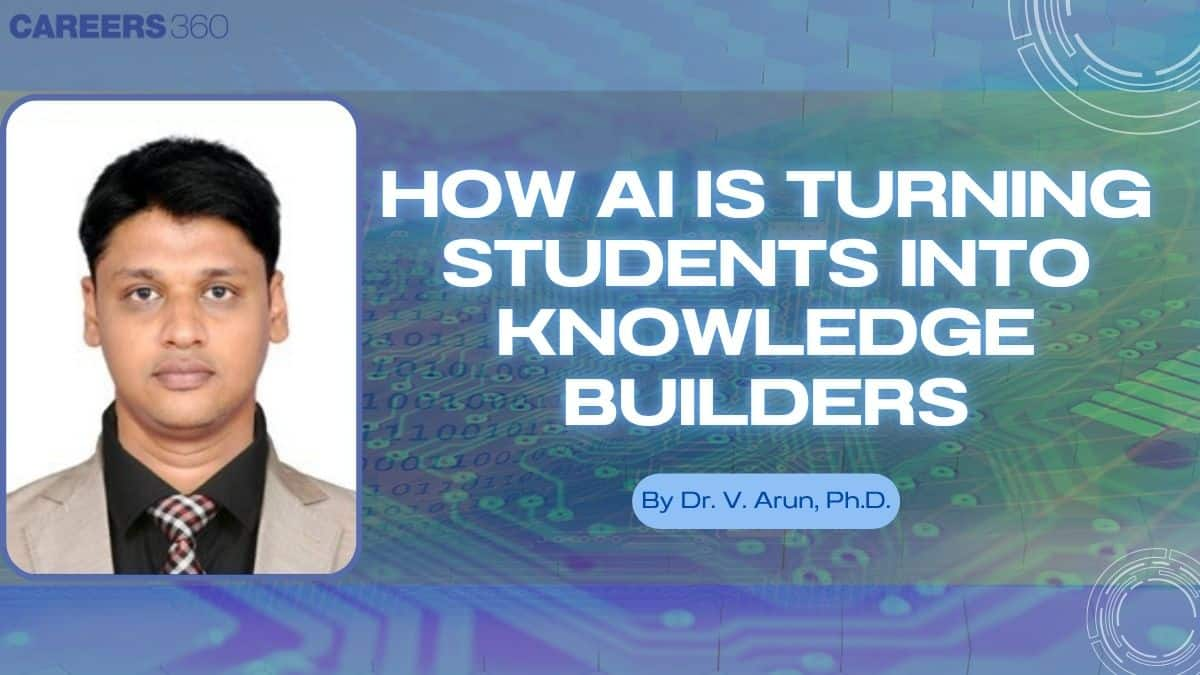Foreign University Campuses in India
Top international universities | Know fees, location, courses offered.
In the modern-day changing scenario of education, technology is playing a revolutionary part in the way student learns and interact with learning. To understand more about this transformation, Careers360 discussed with Dr. V. Arun, Ph.D., Senior Member of IEEE and Professor in the School of Engineering, Mohan Babu University, Tirupati. He expressed his professional opinions on how AI is transforming education and enabling students to become builders of knowledge, and how teachers are adopting more interactive and innovative methods of teaching. Read his knowledgeable views and ideas on the future of AI in education and be a part of the transformation.

The traditional education system has long been built around a structured model that provides fixed study material, relying on teachers with the necessary expertise to deliver information year after year. This approach has been the norm for generations, guiding students from childhood to adulthood in a consistent, predefined manner. However, Artificial Intelligence is challenging this long-standing model, transforming it from the ground up. Today, students, teachers, and technology engage in dynamic, interactive dialogue, shifting the learning process from a one-sided delivery to a more collaborative, evolving exchange.
Where the traditional education system relied upon one-size-fits-all textbooks and tutoring, AI tools have introduced much-needed flexibility. Recognising that students learn, absorb, retain, and apply information in different ways, AI adapts to meet these individual needs. Students and learners can find and generate subject material that adapts to individual pace, style, and interest. From complex math concepts explained by a favourite chatbot to a platform offering real-time, judgment-free feedback on learning, AI has unlocked a more independent level of knowledge and understanding for students and teachers alike. This is just the tip of the iceberg. AI-assisted learning is beginning to shine light on a more profound horizon. Students using AI to ideate, test hypotheses, or generate new content are engaging in a combined process of discovery. When a student collaborates with an AI tool for writing research papers, researching sources, and iterating on concepts, the AI becomes a valuable, unbiased source of information. This opens up opportunities for deeper engagement, critical thinking, and collaborative learning, empowering students to take ownership of their educational journeys.
The advantages of AI translate to teachers as well. Tasks like lecture delivery or test grading, which had to be covered by teachers, are now being outsourced to AI. This frees up crucial bandwidth for teachers, who can now focus on higher-level teaching strategies, like guiding classroom discussions, encouraging several viewpoints and perspectives, assisting students in building the bridge to connect classroom and textbook learnings to real-world applications, scenarios, and issues. By offloading routine tasks, AI enables teachers to become more effective mentors, guiding students toward holistic, critical, and creative thinking. While this knowledge utopia seems promising, the use of AI requires caution, good intent, and responsibility. AI systems, like any technology, are loaded with biases that may affect decision-making. & outcomes. Additionally, not all students have equal access to AI tools, which could create disparities in learning opportunities. To ensure AI’s successful integration into education, stakeholders must establish new protocols that guarantee these technologies are used inclusively, ethically, and transparently. Developing such a framework is crucial to ensure that AI benefits both students and teachers equitably.
By encouraging critical thinking, generating complex analyses, and integrating historical knowledge with contemporary challenges, AI is preparing students for the future, equipping them with the skills they need to thrive in a rapidly changing world.
On Question asked by student community
With an AP EAPCET rank of 62402 in OC EWS category your chances for admission to ECE at Sree Vidyanikethan Engineering College SVEC Tirupati may be limited. Recent cutoff trends show that for General category the closing rank for ECE was around 31229 in Round 1 of counselling . OC
Good afternoon aspirant !!
I am hoping that you are absolutely good and doing well in your field. As per your mentioned query , i will tell you about this college. Sree Vidyanikethan Engineering College, Tirupati is also known as SVEC Tirupati and is situated in Tirupati, Andhra Pradesh. It
Hello Aspirant,
With this rank it will be little difficult for you to get Electronics and Communication Engineering in this college. As per previous year information cutoff for ECE was around 14000. From the below link you can check more details about this college:
https://www.careers360.com/colleges/sri-venkateswara-college-of-engineering-tirupati/cut-off
Cutoff varies every year depending
Hello Aspirant,
As per your query it does not meet any conclusion to us like which exam you gave and for which college you are asking and for which branch also you didnot mentioned so provied us a valid information by that we are able to slove your query and
hai dear !
According previous year cut-off for general category in svec tirupathi is 649 to 2808 . based on this it difficult for you to get cse seat in svec tirupathi . you can try other branches . for more information follow this link
https://www.careers360.com/colleges/sree-vidyanikethan-engineering-college-tirupati/cut-off
you can our college
Among top 100 Universities Globally in the Times Higher Education (THE) Interdisciplinary Science Rankings 2026
Recognized as Institute of Eminence by Govt. of India | NAAC ‘A++’ Grade | Upto 75% Scholarships
Among top 100 Universities Globally in the Times Higher Education (THE) Interdisciplinary Science Rankings 2026
India's youngest NAAC A++ accredited University | NIRF rank band 151-200 | 2200 Recruiters | 45.98 Lakhs Highest Package
Last Date to Apply: 25th Feb | Ranked #43 among Engineering colleges in India by NIRF | Highest Package 1.3 CR , 100% Placements
NAAC A+ Accredited | Among top 2% Universities Globally (QS World University Rankings 2026)